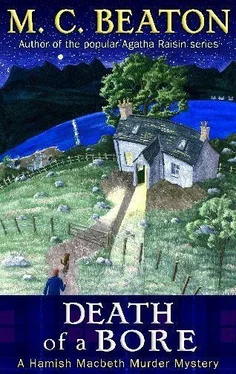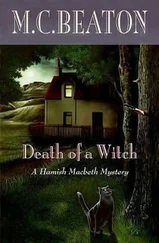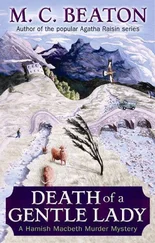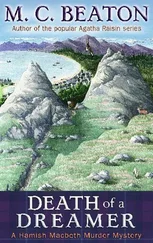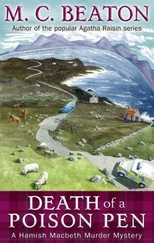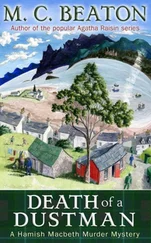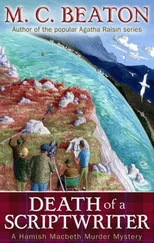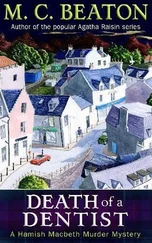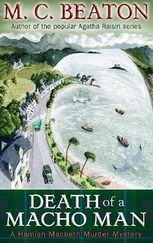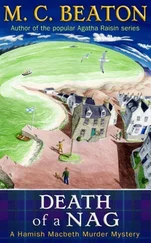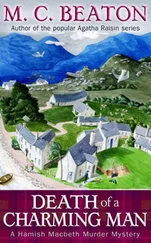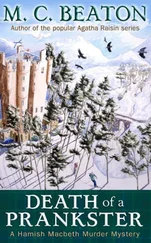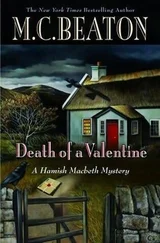Paul Gibson, thought Hamish. Could it have been Paul Gibson?
∨ Death of a Bore ∧
12
Good Lord, what is man! For as simple he looks, Do but try to develop his hooks and his crooks, With his depths and his shallows, his good and his evil, All in all, he’s a problem must puzzle the devil .
—Robert Burns
Hamish phoned back to the police station and checked his messages. There was one from Kirsty. “I’ve got it,” she said.
He phoned the television station and asked to speak to her. “Where can we meet?” he asked.
“You promised me dinner.”
“So I did,” said Hamish. “I’ll meet you at eight o’clock in the Tommel Castle Hotel.”
But when he rang off, his mind was buzzing with the news that it had possibly been Paul Gibson who had been drinking with Jock Ferguson. Damn! He was slipping. He hadn’t asked when. He went back to the Thistle, but the barman couldn’t remember the precise evening, only that it had been about a week ago.
Hamish then phoned Elspeth. “I need your help.”
“Oh, really? I wondered when you were going to deign to talk to me.”
“Come on, Elspeth. I’ve been that busy. This might turn out to be a big story for you.”
“Where are you?”
“I’m in Strathbane, but I can be at the hotel in half an hour.”
“See you in the bar.”
♦
When Hamish entered the bar, Elspeth was sitting in a corner. She was wearing a tailored trouser suit and a white silk blouse. Her hair was smooth and shiny. Once again, he found himself missing the old Elspeth, who wore dreadful clothes and had frizzy hair. This new Elspeth seemed somehow unapproachable.
“Sit down, Hamish. What gives?”
“For the moment this is off the record,” he cautioned her. “Okay. Talk.”
He told her about Jock Ferguson and his suspicion that the forensic man had been drinking with Paul Gibson. Her odd silver eyes fixed on his face, Elspeth asked, “So where do I come in?”
“Gibson’s English. I want to get a bit of background on him. Do you think you could tell him you want to write a profile on him and find out what shows he’s worked on before? I don’t want to pull him in for questioning. If he’s our murderer, then he’s mad and dangerous.”
“Okay, Sherlock. He’s still in the lounge for the great-detective-reveals-all scene. When they break, I’ll catch him.”
There was a long silence. Hamish shifted uncomfortably. Then he said, “I don’t know how to handle us, Elspeth.”
“I know. But I’ve grown out of casual affairs, Hamish.”
“It wasn’t a casual affair.”
“But you didn’t want to make it permanent?”
“No. I mean, I don’t know. If you looked like the old Elspeth, it would be easier to talk. But you look so sophisticated.”
“It’s still me underneath.”
“Let me have time to think, Elspeth.”
She looked at him sadly. “If you need time to think, Hamish Macbeth, then it means you don’t want to commit yourself to anything.”
“I’m not saying that. Please, Elspeth.”
“Okay. I’ll find out about Paul Gibson. Maybe we’ll talk when all this is over.”
“I’d like that.”
Two actors walked into the bar. Elspeth got to her feet. “They seem to be taking a break,” she said. “Where will you be?”
“Back at the police station.”
“I’ll phone you if I’ve got something.”
♦
Elspeth went through to the lounge and approached Paul Gibson. “I’m from the Daily Bugle ,” she said. “I wonder if I might interview you.”
“Of course,” he said.
“Now?”
“Yes, now would be fine.”
They sat down in a corner of the lounge. “What’s this?” he said. “No tape recorder, no notebook?”
“I’ve a great memory, and I find either of those things puts people off.” Elspeth did actually tape interviews but saw no reason to waste tape on an interview that would never be published, and she did indeed have an excellent memory. “Just begin at the beginning and go on from there. What attracted you to show business?”
Paul seemed only too happy to talk. He had grown up in the East End of London. His family life had been unhappy. His father had run away when he was very small. He had spent a lot of his time at the cinema. After school he had managed to get a degree in media studies at Luton University and had got a job as a researcher at the BBC. He had progressed to script editor and then director. He had decided to freelance. He described the shows he had directed. There was a production of Vanity Fair and then a popular spy series. The spy series had been filmed in 1995. There was a gap until he began to direct a few soap operas starting in 1998, which had all been failures, Elspeth remembered.
“What were you doing between 1995 and 1998?” she asked.
“Oh, this and that,” he said airily. Elspeth did not press him. He said that when Harry Tarrant had phoned his agent and offered the job in the Highlands, he had been delighted to accept. “I’ve always been romantic about Scotland,” he enthused.
“Did you have any difficulties with John Heppel’s script? I mean, he was hardly a television writer.”
“Oh, I tweaked it a bit. John was happy. We got on just fine.”
Elspeth then let him talk on about himself and his brilliance as a director and finished by taking photographs of him.
Then she went up to her room and typed out everything he had said on her computer, printed it off, and took it down to the police station in Lochdubh.
“This last soap he directed, Spanish Nights , it didn’t run long, did it?” asked Hamish.
“It was a monumental failure. They even built a pseudo-village in Spain to use as the setting.”
“But this gap. What was the spy series?”
“It was called Betrayal . Filmed by Church Television. They do a lot of programmes for ITV. I’ll phone the office in London and see if they’ve got a contact.”
Hamish went into the kitchen, where he fed Lugs, lit the stove, and put on a kettle of water for coffee. Elspeth was on the phone for half an hour.
She finally joined him, her face flushed with excitement. “I got through to Church Television. I spoke to one of the producers. He remembers Paul. He was fired from the spy series after the third episode. He had been quarrelling the whole time with the producer, and then he punched him in the face, right on the set, calling him an amateur. He was fired and had a nervous breakdown. The company were very sympathetic. Said he’d been working very hard and it was due to stress.”
Hamish went through to the computer. “Let me get his statement. Here we are. He says he was back at his digs in Strathbane the whole evening of the murder. I’m going down there to question his neighbours.”
But when Hamish arrived at Paul’s address in Strathbane, it was to find that he rented the top half of a villa and that the people downstairs were away on holiday and none of the neighbours had noticed him coming or going.
He went back to Lochdubh, walked Lugs, and changed into his one good suit, then went to the hotel to meet Kirsty.
Her first words were, “Aren’t we going to get a drink at the bar first?”
“We’ll have one at the table,” said Hamish. He wanted to make the evening as short as possible so that he could study that script at his leisure.
She was wearing a skimpy top, which showed her bare midriff, and low-slung velvet trousers. She had a small diamond in her navel.
Hamish was always glad that there was a new maître d’ at the hotel to replace the Halburton-Smythes’ former butler, who had once filled that post. He had always sneered at Hamish.
Читать дальше
